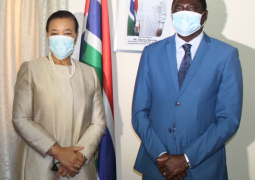Chairman Joof made this remark at a press conference held at NHRC office in Kotu on Friday.
He said the NHRC commends the NAATIP for taking notable steps to combat trafficking in persons in The Gambia.
He added that the commission recognises the launching of the National Referral Mechanism (NRM) for vulnerable migrants, the development of the National Plan of Action (NPOA) on trafficking in persons 2021-2025, the validation of the standard operating procedure on trafficking in persons in 2021 and the amendment of the Labour Bill to incorporate domestic workers and the rights of domestic workers.
According to him, NHRC acknowledges efforts of the Agency to educate law enforcement agencies and security officials on trafficking in persons following training conducted for immigration officers, the Gambia Police Force and State Intelligence officers during the reporting year.
"Notwithstanding, trafficking in persons continues to remain a challenge in The Gambia," he said.
Chairman Joof said NAATIP has identified challenges of combating trafficking in The Gambia including reluctance from victims to participate in court proceedings due to stigma, long adjournment of court proceedings causing a delay in the prosecution of cases and limited facilities to accommodate victims of trafficking with only one government facility providing shelter to children, the elderly and victims of trafficking.
According to the U.S. State Department's Trafficking in Persons report on The Gambia in 2021, women, girls and some boys are subjected to sex trafficking and forced labour in street vending and domestic work.
The report also included reports of forced labour of Gambian children in neighbouring countries such as Mauritania and the recruitment and exploitation of male and female workers in countries such as Lebanon, Kuwait and United Arab Emirates (UAE).





